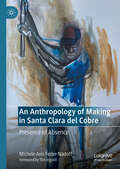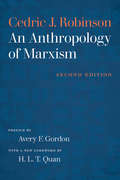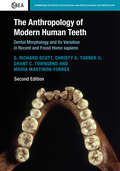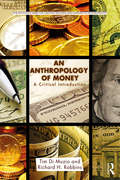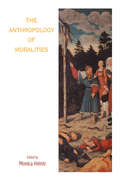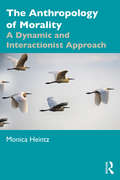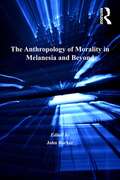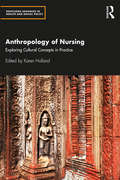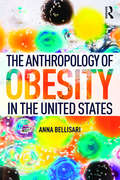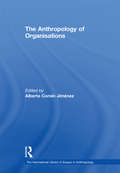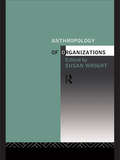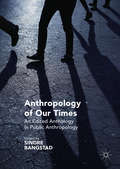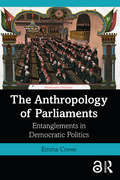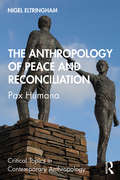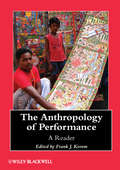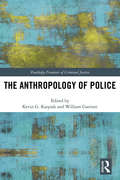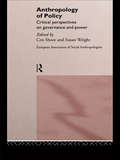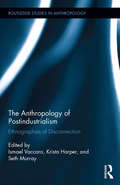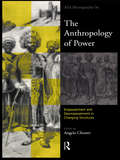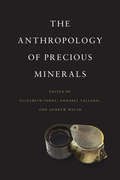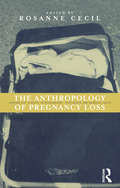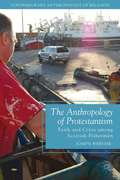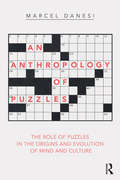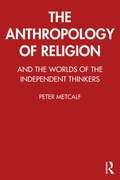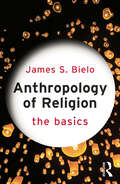- Table View
- List View
An Anthropology of Making in Santa Clara del Cobre: Presence of Absence
by Michele Avis Feder-NadoffThis book offers a nuanced reflection on the meaning of making and artisan agency, demonstrating how copper-smithing produces not only objects, but also lives, worlds, meanings, and social transformation. Through long-term ethnography, grounded in apprenticeship to master coppersmith Jesús Pérez Ornelas, Feder-Nadoff’s intimate description of communal and artisanal life in Santa Clara del Cobre, Michoacán, México provides a critical reappraisal of aesthetics and compelling ways to think about how aura and agency are produced. By mapping flows and frictions between persons, places, and things, this study closes the gap between economic and socio-political analysis of craft, on the one hand, and aesthetic, material, and phenomenological studies of making, on the other. Although craft historically plays a prominent national, even ideological role in Mexico, as in many countries, most artisans ironically remain absent, often living in marginalized, precarious circumstances. By tracing the cycles of life, death, and afterlife, of these maker-protagonists, their bodies of knowledge, skilled performances, and objects, this poetic monograph testifies to their presence.
An Anthropology of Marxism (Race And Representation Ser.)
by Cedric J. RobinsonAn Anthropology of Marxism offers Cedric Robinson's analysis of the history of communalism that has been claimed by Marx and Marxists. Suggesting that the socialist ideal was embedded both in Western and non-Western civilizations and cultures long before the opening of the modern era and did not begin with or depend on the existence of capitalism, Robinson interrogates the social, cultural, institutional, and historical materials that were the seedbeds for communal modes of living and reimagining society. Ultimately, it pushes back against Marx's vision of a better society as rooted in a Eurocentric society, and cut off from its own precursors. Accompanied by a new foreword by H.L.T. Quan and a preface by Avery Gordon, this invaluable text reimagines the communal ideal from a broader perspective that transcends modernity, industrialization, and capitalism.
The Anthropology of Modern Human Teeth: Dental Morphology and Its Variation in Recent and Fossil Homo sapien (Cambridge Studies in Biological and Evolutionary Anthropology #79)
by G. Richard Scott Christy G. Turner II Grant C. Townsend Martinón-Torres María Martinón-TorresAll humans share certain components of tooth structure, but show variation in size and morphology around this shared pattern. This book presents a worldwide synthesis of the global variation in tooth morphology in recent populations. <P><P>Research has advanced on many fronts since the publication of the first edition, which has become a seminal work on the subject. This revised and updated edition introduces new ideas in dental genetics and ontogeny and summarizes major historical problems addressed by dental morphology. The detailed descriptions of 29 dental variables are fully updated with current data and include details of a new web-based application for using crown and root morphology to evaluate ancestry in forensic cases. A new chapter describes what constitutes a modern human dentition in the context of the hominin fossil record.
An Anthropology of Money: A Critical Introduction (Routledge Series for Creative Teaching and Learning in Anthropology)
by Tim Di Muzio Richard H. RobbinsAn Anthropology of Money: A Critical Introduction shows how our present monetary system was imposed by elites and how they benefit from it. The book poses the question: how, by looking at different forms of money, can we appreciate that they have different effects? The authors demonstrate how modern money requires perpetual growth, an increase in inequality, environmental devastation, increasing commoditization, and, consequently, the perpetual consumption of ever more stuff. These are not intrinsic features of money, but, rather, of debt-money. This text shows that, through studying money in other cultures, we can have money that better serves the broader goals of society.
The Anthropology of Moralities (Berghahn Ser.)
by Monica HeintzAnthropologists have been keenly aware of the tension between cultural relativism and absolute norms, and nowhere has this been more acute than with regards to moral values. Can we study the Other’s morality without applying our own normative judgments? How do social anthropologists keep both the distance required by science and the empathy required for the analysis of lived experiences? The plurality of moralities has not received an explicit and focused attention until recently, when accelerated globalization often resulted in the collision of different value systems. Observing, describing and assessing values cross-culturally, the authors propose various methodological approaches to the study of moralities, illustrated with rich ethnographic accounts, thus offering a valuable guide for students of anthropology, sociology and cultural studies and for professionals concerned with the empirical and cross-cultural study of values.
The Anthropology of Morality: A Dynamic and Interactionist Approach (Berghahn Ser.)
by Monica HeintzWhy, when and where are some moral systems supported and followed whilst others are condemned? Are moral values relative or universal? Can immoral actions be tolerated in times of crisis? Is the dream of becoming better sufficient for prompting virtuous behavior, or should we dream about what is best? Do moral values last? The divergence in practices and codes of moral belief and action present significant challenges but also offer opportunities to anthropologists for understanding social life. In this book, Monica Heintz explores these questions, drawing on case studies from Eastern Europe that encompass migration, religion, economic and social policies and paying particular attention to the way morality works in communities undergoing rapid social change. She uses these examples to reflect on the wider question of societal conflict and change, showing how they are driven by moral values. By highlighting the centrality of such values as engines for action and questioning the limits of universal moral values, she argues that anthropology has the capacity to shed light on the study of morality and moral values generally. The Anthropology of Morality: A Dynamic and Interactionist Approach will be of interest to students and researchers in anthropology, as well as those in politics and sociology with an interest in European politics.
The Anthropology of Morality in Melanesia and Beyond (Anthropology and Cultural History in Asia and the Indo-Pacific)
by John BarkerThe Anthropology of Morality in Melanesia and Beyond examines how Melanesians experience and deal with moral dilemmas and challenges. Taking Kenelm Burridge’s seminal work as their starting point, the contributors focus upon public situations and types of people that exemplify key ethical contradictions for members of moral communities. While returning to some classical concerns, such as the roles of big men and sorcerers, the book opens new territory with richly textured ethnographic studies and theoretical reviews that explore the interface between the values associated with indigenous village life and the ethical orientations associated with Christianity, the state, the marketplace, and other facets of ’modernity'. A major contribution to the emerging field of the anthropology of morality, the volume includes some of the most prominent scholars working in the discipline today, including Bruce Knauft, Joel Robbins, F.G. Bailey, Deborah Gewertz and Frederick Errington.
Anthropology of Nursing: Exploring Cultural Concepts in Practice
by Karen HollandThis book aims to introduce nurses and other healthcare professionals to how anthropology can help them understand nursing as a profession and as a culture. Drawing on key anthropological concepts, the book facilitates the understanding and critical consideration of nursing practice, as seen across a wide range of health care contexts, and which impacts the delivery of appropriate care for service users. Considering the fields in which nurses work, the book argues that in order for nurses to optimize their roles as deliverers of patient care, they must not only engage with the realities of the cultural world of the patient, but also that of their own multi-professional cultural environment. The only book currently in the field on anthropology of nursing, this book will be a valuable resource for nursing students at all academic levels, especially where they can pursue specific modules in the subject, as well as those other students pursuing medical anthropology courses. As well as this, it will be an essential text for those post-graduate students who wish to consider alternative world views from anthropology and their application in nursing and healthcare, in addition to their undertaking ethnographic research to explore nursing in all its fields of practice.
The Anthropology of Obesity in the United States
by Anna BellisariThis volume examines the biocultural dimensions of obesity from an anthropological perspective in an effort to broaden understanding of a growing public health concern. The United States of America currently has the highest rates of obesity among developed countries, with an alarming rise in prevalence in recent decades which promises to affect the nation for years to come. Bellisari helps students to grasp the complex nature of this obesity epidemic, demonstrating that it is the consequence of many interacting forces which range from individual genetic and physiological predispositions to national policies and American cultural beliefs and practices. As much a social problem as an individual one, the development of obesity is in fact encouraged by the pattern of high consumption and physical inactivity that is promoted by American economic, political, and ideological systems. With a range of up-to-date scientific and medical data, The Anthropology of Obesity in the United States provides students with a comprehensive picture of obesity, its multiple causes, and the need for society-wide action to address the issue.
The Anthropology of Organisations (The International Library of Essays in Anthropology)
by Alberto Corsín JiménezThe Anthropology of Organisations offers a critical overview of the work that for over sixty years anthropologists have been carrying out in and on organisations and of the contribution that this work has made to social theory at large. Moving beyond earlier preoccupations with ’culture’ and ’relationality’, the volume brings together a selection of classic and contemporary articles that cast new light on the relevance of ethnography for organisational and social theory. It offers an indispensable resource for students and scholars interested in the politics behind the institutionalisation of social life.
Anthropology of Organizations
by Susan WrightThe 1980s and 1990s have been a time of change for organizations, with a preoccupation for changing `organizational culture', a concept attributed to anthropology. These changes have been accompanied by questions about different styles of organizing. In both public and private sector organizations and in the first and third worlds, there is now a concern to understand how organizational change can be achieved, how indigenous practices can be incorporated to maximum effect, and how opportunities can be improved for disadvantaged groups, particularly women. The Anthropology of Organizations questions `organizational culture' as a tool of management and presents and analyses the latest anthropological work on the management of organizations and their development, demonstrating the use of recent theory and examining the practical problems which anthropology can help to solve.
Anthropology of Our Times: An Edited Anthology in Public Anthropology
by Sindre BangstadThis anthology represents the culmination of a series of public discussions with some of the leading international anthropologists of today --organized by the editor, Sindre Bangstad--at the House of Literature in Oslo, Norway. Thus, it provides fresh and original insights into the lives and work of these leading scholars. It features conversations with Didier Fassin, Angelique Haugerud, Ruben Andersson, Claudio Lomnitz, David Price, Magnus Marsden, Richard Ashby Wilson, and Parvis Ghassem-Fachandi, in addition to an introduction by Sindre Bangstad and a preface by Thomas Hylland Eriksen.
The Anthropology of Parliaments: Entanglements in Democratic Politics
by Emma CreweThe Anthropology of Parliaments offers a fresh, comparative approach to analysing parliaments and democratic politics, drawing together rare ethnographic work by anthropologists and politics scholars from around the world. Crewe’s insights deepen our understanding of the complexity of political institutions. She reveals how elected politicians navigate relationships by forging alliances and thwarting opponents; how parliamentary buildings are constructed as sites of work, debate and the nation in miniature; and how politicians and officials engage with hierarchies, continuity and change. This book also proposes how to study parliaments through an anthropological lens while in conversation with other disciplines. The dive into ethnographies from across Africa, the Americas, Asia, Europe, the Middle East and the Pacific Region demolishes hackneyed geo-political categories and culminates in a new comparative theory about the contradictions in everyday political work. This important book will be of interest to anyone studying parliaments but especially those in the disciplines of anthropology and sociology; politics, legal and development studies; and international relations.
The Anthropology of Peace and Reconciliation: Pax Humana (Critical Topics in Contemporary Anthropology)
by Nigel EltringhamThis book offers a uniquely comparative, case-study perspective on the anthropology of peace and reconciliation. In the contemporary world, the end of violent conflict often gives way to one, or a combination, of five interventions designed to strengthen “peace” and facilitate “reconciliation”. These interventions are: the reinvigoration of “traditional” conflict management mechanisms; the collection and preservation of testimony; truth commissions; international criminal trials; and memorialisation. Social anthropologists have challenged the received wisdom on which these interventions are based, arguing that they fail to adequately take into account and sensitively manage the needs and expectations of those who have lived through conflict. Exploring the five interventions through detailed ethnographic accounts from around the world, this book demonstrates that although social anthropologists adopt a critical stance, they do not dismiss “received wisdom” out of hand; rather, they advocate that interventions should be subject to continuous evaluation according to the evolving, often contradictory, needs and wishes of those who strive to survive among the ruins of their former lives. This is essential reading for scholars of peace studies, conflict resolution studies and those taking an anthropological approach to conflict, violence, human rights and law.
The Anthropology of Performance
by Frank J. KoromThe Anthropology of Performance is an invaluable guide to this exciting and growing area. This cutting-edge volume on the major advancements in performance studies presents the theories, methods, and practices of performance in cultures around the globe. Leading anthropologists describe the range of human expression through performance and explore its role in constructing identity and community, as well as broader processes such as globalization and transnationalism.Introduces new and advanced students to the task of studying and interpreting complex social, cultural, and political events from a performance perspectivePresents performance as a convergent field of inquiry that bridges the humanities and social sciences, with a distinctive cross-cultural perspective in anthropologyDemonstrates the range of human expression and meaning through performance in related fields of religious & ritual studies, folkloristics, theatre, language arts, and art & danceExplores the role of performance in constructing identity, community, and the broader processes of globalization and transnationalismIncludes fascinating global case studies on a diverse range of phenomenaContributions from leading scholars examine verbal genres, ritual and drama, public spectacle, tourism, and the performances embedded in everyday selves, communities and nations
The Anthropology of Police: The Anthropology Of Police In Practice (Routledge Frontiers of Criminal Justice)
by Kevin G. Karpiak William GarriottWhat are the potential contributions of anthropology to the study of police? Even beyond the methodological particularities and geographic breadth of cultural anthropology, there are a set of conceptual and analytical traditions that have much to bring to broader scholarship in police studies. Including original and international contributions from both senior and emerging scholars, this pioneering book represents a foundational document for a burgeoning field of study: the anthropology of police. The chapters in this volume open up the question of police in new ways: mining the disciplinary legacies of anthropology in order to discover new conceptual tools, methods, and pedagogies; reworking relationships between "police," "public," and "researcher" in ways that open up new avenues for exploration at the same time as they articulate new demands; and retracing a hauntology that, through interactions with individuals and collectives, constitutes a body politic through the figure of police. Illustrating the various ways that anthropology enables a reassessment of the police/violence relationship with a broad consideration of the human stakes at the center, this book will be of interest to criminologists, sociologists, anthropologists, and the broad interdisciplinary field invested in the study of policing, order-making, and governance.
Anthropology of Policy: Perspectives on Governance and Power (European Association of Social Anthropologists)
by Cris Shore Susan WrightArguing that policy has become an increasingly central concept and instrument in the organisation of contemporary societies and that it now impinges on all areas of life so that it is virtually impossible to ignore or escape its influence, this book argues that the study of policy leads straight into issues at the heart of anthropology.
The Anthropology of Postindustrialism: Ethnographies of Disconnection (Routledge Studies in Anthropology)
by Ismael Vaccaro Krista Harper Seth MurrayThis volume explores how mechanisms of postindustrial capitalism affect places and people in peripheral regions and de-industrializing cities. While studies of globalization tend to emphasize localities newly connected to global systems, this collection, in contrast, analyzes the disconnection of communities away from the market, presenting a range of ethnographic case studies that scrutinize the framework of this transformative process, analyzing new social formations that are emerging in the voids left behind by the de-industrialization, and introducing a discussion on the potential impacts of the current economic and ecological crises on the hyper-mobile model that has characterized this recent phase of global capitalism and spatially uneven development.
The Anthropology of Power (ASA Monographs)
by Angela CheaterAn edited collection which examines the theoretical issues surrounding power, and particularly empowerment, which uses ethnographic analysis as its basis. It takes material from the Middle East, Canada, Columbia, Australasia and various parts of Europe and Africa. It looks particularly at the extent to which traditionally disempowered groups gain influence in postcolonial or multicultural settings, and at how power relates to economic development, gender and environmentalism.
The Anthropology of Precious Minerals
by Elizabeth Ferry Annabel Vallard Andrew WalshWhy do people single out gold, sapphires, diamonds, and other minerals as particularly “precious”? What makes precious minerals “precious”? Drawing from ethnographic and cross-cultural research, this collection of anthropological essays and case studies answers these questions by exploring humans’ multifaceted relationships with the minerals they deem “precious.” The Anthropology of Precious Minerals addresses the entanglement of humans and minerals, with a particular focus on the practices of scrappers, miners, and hunters as they work to extract value. The editors draw from history, archaeology, and ethnography, and remind us that “preciousness” must always be understood in relation to complex cultural, political-economic, and semiotic systems of value.
Anthropology of Pregnancy Loss: Comparative Studies in Miscarriage, Stillbirth and Neo-natal Death
by Rosanne CecilHow much influence does culture have on a mother's reactions to pregnancy loss? At what stage is a fetus attributed with human status? How does this affect the mother's reactions to the loss of a baby?Contemporary, historical and oral-history accounts from regions as diverse as rural North India, urban America, South Africa and Northern Ireland, provide a fascinating insight into the experience and management of miscarriage across a number of different cultures. The authors explore how the social, technological and medical context in which miscarriages occur can affect the ways in which women experience such an event. In the West, advances in medical technology, a low infant-mortality rate and a low birth rate have raised expectations as to the successful outcome of each pregnancy. In addition, the early confirmation of pregnancy makes consequent pregnancy loss -- which might have gone unnoticed or unconfirmed in the past -- all the more difficult for mothers in the West. Yet, mourning rituals and behaviour at a pregnancy loss, which may be elaborate in some societies, are generally considered to be inappropriate in many Western societies. Differing social beliefs regarding the causes of miscarriage, preventative measures and curative treatments are also examined. Medical anthropologists, sociologists and health professionals will all find this book fascinating reading.
The Anthropology of Protestantism
by Joseph WebsterNarrowing in from the broader context of the north Atlantic, through northern Europe, to Britain, northeast Scotland, and finally the fishing village of Gamrie, this anthropology of Protestantism examines millennialist faith and economic crisis. Through his ethnographic study of the fishermen and their religious beliefs, Webster speaks to larger debates about religious radicalism, materiality, economy, language, and the symbolic. These debates (occurring within the ostensibly secular context of contemporary Scotland) also call into question assumptions about the decline of religion in modern industrial societies. By chronicling how these individuals experience life as "enchanted," this book explores the global processes of religious conversion, economic crisis, and political struggle.
An Anthropology of Puzzles: The Role of Puzzles in the Origins and Evolution of Mind and Culture
by Marcel DanesiAn Anthropology of Puzzles argues that the human brain is a "puzzling organ" which allows humans to literally solve their own problems of existence through puzzle format. Noting the presence of puzzles everywhere in everyday life, Marcel Danesi looks at puzzles in society since the dawn of history, showing how their presence has guided large sections of human history, from discoveries in mathematics to disquisitions in philosophy. Danesi examines the cognitive processes that are involved in puzzle making and solving, and connects them to the actual physical manifestations of classic puzzles. Building on a concept of puzzles as based on Jungian archetypes, such as the river crossing image, the path metaphor, and the journey, Danesi suggests this could be one way to understand the public fascination with puzzles. As well as drawing on underlying mental archetypes, the act of solving puzzles also provides an outlet to move beyond biological evolution, and Danesi shows that puzzles could be the product of the same basic neural mechanism that produces language and culture. Finally, Danesi explores how understanding puzzles can be a new way of understanding our human culture.
The Anthropology of Religion
by Peter MetcalfThis book describes how anthropologists in the twentieth century went about documenting the religions of those independent peoples who still lived beyond the frontiers of the global economy and the world religions. It begins by examining the enormous popularity of the newly-invented field of anthropology in the nineteenth century as a site of multiple intellectual developments. Its climax was Frazer’s Golden Bough, which is a pillar of modernity second only to Darwin’s Origin of Species. But its notion of religion was entirely speculative. When anthropologists went to see for themselves, they encountered formidable obstacles. How to access a people’s most profound understandings of the world and everything in it? Holding fast to the premise that ethnographers have no special powers of seeing inside other people’s brains, this book teaches students to proceed slowly, a step at a time, watching how people perform rituals great and small, asking questions that seem stupid to their hosts, and struggling to translate abstract terms in unrecorded languages. Using a handful of examples from different continents, the book shows the potential of an anthropological approach to religion.
Anthropology of Religion: The Basics (The Basics)
by James S BieloAnthropology of Religion: The Basics is an accessible and engaging introductory text organized around key issues that all anthropologists of religion face. This book uses a wide range of historical and ethnographic examples to address not only what is studied by anthropologists of religion, but how such studies are approached. It addresses questions such as: How do human agents interact with gods and spirits? What is the nature of doing religious ethnography? Can the immaterial be embodied in the body, language and material objects? What is the role of ritual, time, and place in religion? Why is charisma important for religious movements? How do global processes interact with religions? With international case studies from a range of religious traditions, suggestions for further reading, and inventive reflection boxes, Anthropology of Religion: The Basics is an essential read for students approaching the subject for the first time.
